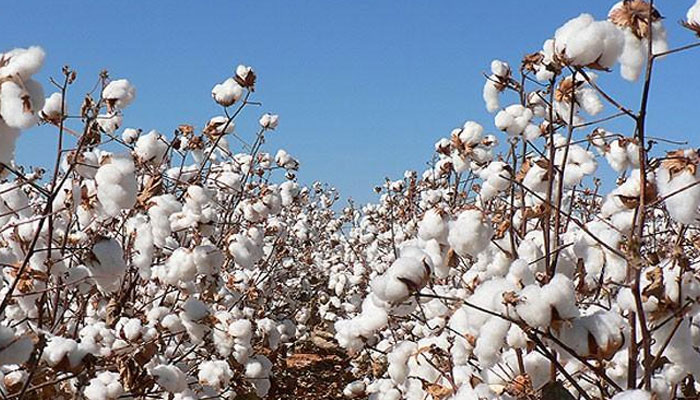ECC to take up summary to ensure yarn availability
The growth pace could slow down amid the shortage of raw materials, according to traders who called for duty-free imports of yarn from any country, including India.
ISLAMABAD: The Economic Coordination Committee will take up a summary in the next meeting to ensure availability of cotton and yarn in the coming months, commerce adviser said on Monday.
The decision was taken during a meeting in which Prime Minister Imran Khan discussed escalating prices of cotton yarn with the officials, Adviser for Commerce and Investment Razak Dawood said in a Twitter message.
“In order to ease the pressure on yarn and keep momentum of value-added exports, all steps [must] be taken through cross-border imports of cotton yarn including by land,” Dawood cited the PM as saying. The adviser said a summary would be presented at the next Economic Coordination Committee’s meeting.
This was the second time in a month when the premier stressed cross-border import of the industrial inputs as cotton production came down to 5.5 million bales from as much as 15 million bales recoded annually in previous years.
Although textile and clothing exports increased more than seven percent to $9.9 billion in the eight months of the current fiscal year, the growth pace could slow down amid the shortage of raw materials, according to traders who called for duty-free imports of yarn from any country, including India.
Value-added sector also termed exports of raw cotton as a reason for escalating prices in the local market. Cotton yarn exports increased 35.8 percent in quantity terms in February to 44,419 tons compared to 32,694 metric tons in January, Jawed Bilwani, chairman of Pakistan Apparel Forum said.
“The essential raw material and resource could be converted into high value-added products like garments for export to earn more foreign exchange and generate more employment,” Bilawani said.
“The government should immediately ban export of cotton yarn and abolish existing 5 percent custom duty on import of cotton yarn below 40-single count and allow its import from all over the world, including India for at least next four months.”
Cotton yarn prices increased 40 percent. The situation has also compelled the exporters not to take further new orders. Bilwani said US dollar depreciated by seven percent against the US dollar, which is also a matter of concern for exporters.
“The value-added garment and home textile exporters are suffering from both sides. Government must support and facilitate the value-added garment and home textile exporters on war footing basis,” he said.
Value-added textile exports contribute to around 62 percent in total exports, provides 42 percent urban employment particularly to female workforce, and supports approximately 40 allied industries, he added.
-
 18-month Old On Life-saving Medication Returned To ICE Detention
18-month Old On Life-saving Medication Returned To ICE Detention -
 Cardi B Says THIS About Bad Bunny's Grammy Statement
Cardi B Says THIS About Bad Bunny's Grammy Statement -
 Major Hollywood Stars Descend On 2026 Super Bowl's Exclusive Party
Major Hollywood Stars Descend On 2026 Super Bowl's Exclusive Party -
 Sarah Ferguson's Silence A 'weakness Or Strategy'
Sarah Ferguson's Silence A 'weakness Or Strategy' -
 Garrett Morris Raves About His '2 Broke Girls' Co-star Jennifer Coolidge
Garrett Morris Raves About His '2 Broke Girls' Co-star Jennifer Coolidge -
 Winter Olympics 2026: When & Where To Watch The Iconic Ice Dance ?
Winter Olympics 2026: When & Where To Watch The Iconic Ice Dance ? -
 Melissa Joan Hart Reflects On Social Challenges As A Child Actor
Melissa Joan Hart Reflects On Social Challenges As A Child Actor -
 'Gossip Girl' Star Reveals Why She'll Never Return To Acting
'Gossip Girl' Star Reveals Why She'll Never Return To Acting -
 Chicago Child, 8, Dead After 'months Of Abuse, Starvation', Two Arrested
Chicago Child, 8, Dead After 'months Of Abuse, Starvation', Two Arrested -
 Travis Kelce's True Feelings About Taylor Swift's Pal Ryan Reynolds Revealed
Travis Kelce's True Feelings About Taylor Swift's Pal Ryan Reynolds Revealed -
 Michael Keaton Recalls Working With Catherine O'Hara In 'Beetlejuice'
Michael Keaton Recalls Working With Catherine O'Hara In 'Beetlejuice' -
 King Charles, Princess Anne, Prince Edward Still Shield Andrew From Police
King Charles, Princess Anne, Prince Edward Still Shield Andrew From Police -
 Anthropic Targets OpenAI Ads With New Claude Homepage Messaging
Anthropic Targets OpenAI Ads With New Claude Homepage Messaging -
 US Set To Block Chinese Software From Smart And Connected Cars
US Set To Block Chinese Software From Smart And Connected Cars -
 Carmen Electra Says THIS Taught Her Romance
Carmen Electra Says THIS Taught Her Romance -
 Leonardo DiCaprio's Co-star Reflects On His Viral Moment At Golden Globes
Leonardo DiCaprio's Co-star Reflects On His Viral Moment At Golden Globes




